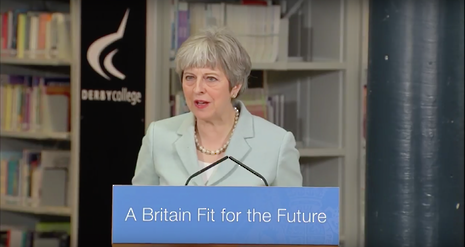Cambridge reacts to Theresa May’s review of tuition fees
The prime minister is seeking to change the current system, after the Conservatives performed poorly in student towns in last year’s election

Theresa May has launched a year-long independent review into provision of tertiary education, which may lead to an overhaul of the tuition fees system.
The long-awaited review represents the government’s attempt to address Labour’s electoral surge in university towns, including Cambridge, Bath and Canterbury, in the last election.
Speaking in Derby, the prime minister acknowledged that England had “one of the most expensive systems of university tuition in the world” and that “the level of fees charged do not relate to the cost or quality of the course”.
She also suggested the review might restore some means-tested grants, by examining “how we can give people from disadvantaged backgrounds an equal chance to succeed. That includes how disadvantaged students and learners receive maintenance support, both from government and universities and colleges”.
The move was cautiously welcomed by CUSU president Daisy Eyre, who said: “We hope that the funding review leads to them deciding to change the current model to make it a model that is more affordable for students”.
Cambridge Defend Education told Varsity the review “is just another attempt to reboot the failed marketisation agenda.”
“Theresa May has admitted that our higher education system is broken,” they said. “But the answer isn’t two-year degrees or a tiered system between humanities and sciences. The answer is the abolition of all tuition fees and the reintroduction of maintenance grants. Education is a public good, and should be treated as such.”
However, May has ruled out abolishing tuition fees, saying she remains committed to the principle that those “who benefit directly from higher education should contribute directly towards the cost of it.”
The review, chaired by the author and former banker Philip Augar, will examine accessibility, funding arrangements, provision of technical training, and competition in the tertiary education sector.
Although the prime minister refused to comment on the review’s potential findings, ministerial comments have invited speculation. A reduction of the maximum fees from £9,250 to £6,000 has been proposed.
On Sunday, the new education secretary, Damian Hinds, hinted that the review could propose cutting fees for some courses based on their cost and prospective graduate earnings.
The introduction of ‘subject-variable’ tuition fees would mostly affect arts courses and non-Russell Group universities.
Speaking to The Sunday Times, Hinds said: “We have a system where you have almost all institutions and almost all courses at those institutions charging exactly the same price where some cost higher amounts [to teach] than others and some have higher returns to the student than others… I would like to see options available which have different costs attached to them.”
This proposal has been criticised by a number of MPs, including Cambridge MP Daniel Zeichner.
In a statement, Zeichner said that “the concept of charging less for cheaper courses is very damaging and discriminatory… it creates disparity in the state’s idea of the value of different disciplines.”
“We have been trying to get more people into STEM courses; it is completely illogical to make those courses more expensive when considering the skills the country needs,” he said.
“There’s already a black hole in the Tories’ tuition fee model, and this will do nothing but make it worse.”
Other proposed changes include a cut in the interest rate on student debt, a change in the salary level at which repayments begin, and an increase in the number of two-year ‘sandwich’ courses. Damian Hinds has previously spoken in support of two-year courses.
The interest rate, which is currently 6.1%, has been a focus of intense criticism. In July, the Institute for Fiscal Studies found that students from the poorest backgrounds will now graduate with debts in excess of £57,000.
In her speech, May also directly addressed Labour’s policy of abolishing tuition fees, arguing that it would lead to higher taxation on those who didn’t attend university and a cap on student numbers
 News / Uni Scout and Guide Club affirms trans inclusion 12 December 2025
News / Uni Scout and Guide Club affirms trans inclusion 12 December 2025 News / Pembroke to convert listed office building into accom9 December 2025
News / Pembroke to convert listed office building into accom9 December 2025 Features / Searching for community in queer Cambridge10 December 2025
Features / Searching for community in queer Cambridge10 December 2025 News / Uni redundancy consultation ‘falls short of legal duties’, unions say6 December 2025
News / Uni redundancy consultation ‘falls short of legal duties’, unions say6 December 2025 News / Gov declares £31m bus investment for Cambridge8 December 2025
News / Gov declares £31m bus investment for Cambridge8 December 2025









